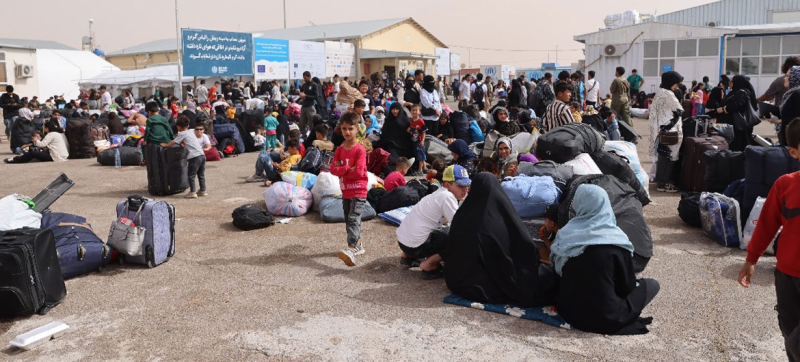- US May Ease Tariffs Further as Trade Gap Narrows |
- Arab-Islamic summit over Israeli strike on Doha Monday |
- NASA Rover Uncovers Strongest Hint of Ancient Life on Mars |
- Eminent Lalon singer Farida Parveen passes away |
- Dr Yunus mourns Farida Parveen's death |
Afghan Returnees Face Hardship in a Country They Barely Know

Afghan families who recently arrived from Iran gather at a border crossing in Herat Province, Afghanistan.
A chaotic wave of returnees from Iran and Pakistan is straining Afghanistan’s already fragile capacity under Taliban rule and threatening broader regional stability, the UN refugee agency (UNHCR) said on Friday.
The agency is calling for calm and cooperation to ensure a dignified path forward for millions of displaced Afghans.
More than 1.6 million Afghans have returned from the two neighbouring countries in 2024 alone, according to UNHCR — a figure that has already surpassed earlier forecasts for the entire year.
The scale and speed of these returns are placing enormous pressure on border provinces that are ill-equipped to absorb them, exacerbating poverty, insecurity, and humanitarian needs in a country still reeling from economic collapse and widespread human rights abuses.
Complicating the situation is the fact that many returnees — especially women and children — are coming back to a country they barely know.
“They are from Afghanistan, but not of Afghanistan — often born abroad with better education and different cultural norms. Their outlook is different from, and often at odds with, present-day Afghanistan,” said Arafat Jamal, UNHCR Representative in the country.
Women and girls, in particular, face a jarring shift: from relative autonomy in host countries to a context where their rights are severely restricted under Taliban edicts.
Mr. Jamal described conditions he witnessed recently in Islam Qala, a key border crossing with Iran.
Daily arrivals have surged to around 50,000 people, many of whom are disoriented and exhausted after long and difficult journeys. UN officials reported scenes of desperation at reception centres.
“Many of these returnees have been abruptly uprooted and have endured exhausting and degrading journeys — they arrive tired, disoriented, brutalised, and often in despair, sprawling across crowded centres in 40°C (104°F) heat,” Jamal said.
While some returns are voluntary, he added that many are happening under duress or without proper protections. Those returning include both officially registered refugees and others in “refugee-like” situations who may face serious risks upon arrival.
The UN and its humanitarian partners have mounted a broad-based response at border points, providing food, water, health services, protection, and onward transportation.
However, critical funding shortfalls are hampering these operations. As of July, UNHCR’s response is only 28 per cent funded, forcing aid agencies to ration supplies and make difficult decisions.
“We are living on borrowed funds,” said Jamal.
“Daily, we ask ourselves — should we give one blanket instead of four? One meal instead of three? These are heartbreaking, soul-destroying decisions.”
The wider UN-led 2025 Humanitarian Needs and Response Plan for Afghanistan — which aims to assist nearly 17 million people and requires $2.4 billion — is only 22 per cent funded.
UN assessments have warned of worsening conditions and deepening poverty inside Afghanistan. The UN Food and Agriculture Organization (FAO) has issued alerts about severe drought, while the UN Development Programme (UNDP) reports that 70 per cent of Afghans already live at subsistence levels.
As returnees cross borders — often without notice or resources — local communities are reaching their breaking point.Jamal noted that this “precarity layered upon poverty” risks fuelling frustration, competition over limited resources, and new forms of social tension.
“Afghanistan may be welcoming, but it is wholly unprepared to receive this volume of returnees,” he warned.
“The communities taking them in are doing so with great generosity, but they are themselves in crisis.”
This growing emergency comes just days after the UN General Assembly overwhelmingly adopted a resolution expressing “deep concern” over the worsening conditions facing Afghans.
The resolution — passed with 116 votes in favour and only two against — urged the Taliban to reverse repressive policies and called for renewed international cooperation to support Afghan civilians.
It also emphasised the need for “coherent approaches” that bridge humanitarian, development, and political efforts, urging donor countries to maintain or increase their support.

